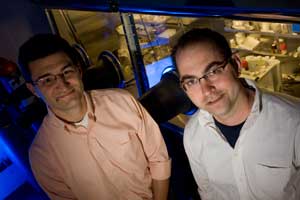Chemists from Rice University used a rare metal, which is not used in nature, to prepare a synthetic enzyme that could help locate and identify thousands of proteins that are challenging to examine, including many that play key roles in cancer and other diseases.

"We combined the chemical capabilities of the rare metal rhodium together with the knowledge of biological systems to identify and select specific proteins," said scientist Zachary Ball, professor of chemistry at the university. "The result is a tool that in most cases is more powerful than any other separate chemical or biological approach."
The researcher began testing di-rhodium catalysts more than three years ago. He did not start with the goal of creating enzymes with them, but because he was interested in research that showed that dirhodium catalysts are capable of changing the substance tryptophan, one of the twenty-one natural amino acids that are the basic building blocks of life.
Catalysts speed up chemical reactions by increasing the reaction rate without being consumed during the reaction. In living things, proteins called enzymes serve the same role. However, unlike many inorganic catalysts, enzymes are highly selective. In the process, which biologists usually liken to the activation process of a "lock and key", enzymes connect only to particles that suit them exactly. This mechanism prevents them from accelerating inappropriate reactions inside the cell.
The researchers wondered if they would be able to combine the high selectivity of enzymatic reactions with the rhodium-based catalyst. They tested the idea by attaching their catalyst to a short stretch of protein that can bind together with other proteins, similar to strands of rope fibers. This "coiled fiber" binding motif is common in biology, especially in signaling proteins. These proteins activate and deactivate developing processes in biological systems such as programmed cell death (apoptosis), a process known to be related to cancer.
"The signaling pathways are similar to a chain of dominoes," says the researcher. "Dozens of proteins may be involved in the pathways, and they react with each other in a gradual manner. In most cases, the reactions are quick and weak. As a result, they are difficult to observe using normal methods, so they are still shrouded in fog when it comes to the role of signaling proteins in health and disease."
The researchers claim that their new synthetic enzyme may solve this problem. In their experiments, the chemists were able to develop synthetic enzymes that could selectively bind to proteins and attach tags to them that would allow biologists to identify them.
Besides tryptophan, the method also worked well with phenylalanine and tyrosine, two amino acids commonly found in signaling proteins. Updated experiments by the research team, which have not yet been published publicly, indicate that the innovative approach may also work with additional amino acids.
The researchers explain that the process still needs to be fine-tuned before it can be used in most biological laboratories, but they are still working to realize the broad applications of the approach.

2 תגובות
So you still need to know what the protein is to which it binds before preparing the marker.
It will not identify unknown proteins as I thought from the title of the article, only the known ones, even though with the elimination method it will be possible to mark unknown proteins as well and at least understand that it is an unknown type of protein and try to identify it.
Rhodium exists in nature, but is very rare and is the most expensive of the Platinum group. See http://en.wikipedia.org/wiki/Rhodium.